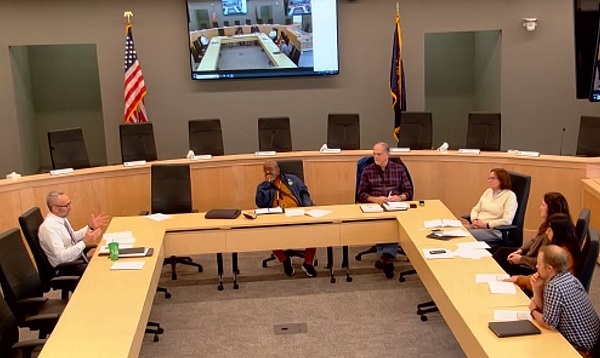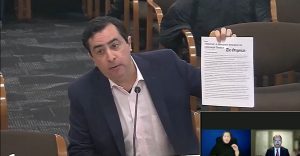After court rulings, Eugene committee asks full council for direction on renter screening fees
7 min read
Presenter: Eugene’s City Council may have to repeal another ordinance. Even if the Oregon Supreme Court upholds Eugene’s $10 cap on renter screening fees, the legislature could change that to zero dollars statewide. At the Intergovernmental Relations Committee Nov. 6:
Lauren Sommers (Assistant city attorney): The current council direction, which has been codified, is that in Eugene, landlords may not charge an applicant screening charge that exceeds $10 or the actual cost of doing the screening, whichever is less. So, by default, typically a $10 cap. That provision was challenged. It was overturned by the circuit court, the trial court, and then appealed.
[00:00:43] The city appealed that decision to the Court of Appeals. The Court of Appeals agreed that the city had the authority to set that $10 cap.
[00:00:50] Presenter: That decision was appealed Nov. 6 to the Oregon Supreme Court. The legislature is also looking at its own cap.
[00:00:59] Lauren Sommers (Assistant city attorney): What Rep. (Mark) Gamba is proposing is a $0 applicant screening charge, which is different than the latest policy direction that staff received from council, which would allow an applicant screening charge, albeit a very small one.
[00:01:14] And so the question for IGR and potentially the full council: Is a no-dollar applicant screening charge consistent with Eugene City Council policy direction, or not? To give Ethan an understanding of whether the city supports the bill or would like to see something different, etc.
[00:01:40] Ethan Nelson (Intergovernmental Relations, manager): The 2023 session, Rep. (Nancy) Nathanson put forth a bill that would allow cities to set caps. We advocated for that bill because at that point it was in alignment with council-adopted policy. And the bill did not move in the building.
[00:01:59] But a compromise was crafted. There would be a work group to come up with a resolution and bring that back in a package. Rep. (Jeff) Helfrich and Rep. (Mark) Gamba had been leading it, and it brought together stakeholders from rental housing and the landlord associations, and our rental housing navigator attended those meetings as did I, and what came out of those was that there was no negotiation.
[00:02:29] Parties were giving information. A lot of those questions are asked. There was a lot of presentation on the cost of these things, what’s included, and so when there was no resolution, Rep. Gamba said, ‘Well, I’m just going to move forward with, this is the direction that we had previously.’
[00:02:44] So my sense is that this bill will get traction, and there will be legislative hearings, and more than likely because Eugene has adopted this, we will be asked to weigh in and engage in a manner. And so having clarity from IGR and also from council is really going to be helpful for us to navigate because it is a politically-sensitive issue.
[00:03:12] Genevieve Middleton (Eugene affordable housing policy and planning manager): In the time leading up to staff bringing the rental protections roadmap to council, the housing policy board provided a recommendation to actually ban the application and screening fees, which would in practice make screening fees a cost of doing business by the landlords.
[00:03:30] We know a little bit more contextual information about screening fees. We conducted the rental housing experience survey in fall of 2023. That was phase one, and then phase two of the survey was a landlords rental housing experience survey that was conducted in spring of 2024.
[00:03:50] And we are currently compiling the results of those two surveys into a report for council, and we’re working to get that to you very soon. But we do have some preliminary results regarding applications.
[00:04:05] So people with housing vouchers (such as Section 8 housing choice vouchers) and people with conviction histories are five times more likely than other renters to have submitted more than 10 applications before finding a place to live.
[00:04:19] We also learned from part two of the survey that professional property managers receive significantly more applications per unit than property owners who manage their own rentals, with most units receiving five or more applications; 55% of property owners versus 10% of property managers say they don’t charge application screening fees.
[00:04:43] And 7% of property owners versus 48% of property managers reported they charge $50 or more per application and screening fees.
[00:04:54] And then we’ve also heard that some property managers require an application fee up front in order to view the unit.
[00:05:01] Likewise, we’ve heard that property managers and owners have shared that the screening costs will be offset by raising rents or other fees.
[00:05:11] Mayor Lucy Vinis: I’m grappling with this. I mean, on the one hand, we just went through this. We’re still going through this whole process to get our $10 cap. I just, like, it’s sort of frustrating to just do all that and then have a statewide bill kind of undo it.
[00:05:26] Councilor Greg Evans: And my problem with this is that similar to the mayor’s, it does curb our ability to govern ourselves in a way that we see fit at the local level, versus having the state tell us what to do.
[00:05:41] If we’re going to do that, we might as well just fold up the tent and just let the state run everything, right? I mean, why would we even be sitting here talking about, you know, intergovernmental relations and all the rest of that, if, every time something comes up, we’re going to end up going at loggerheads with the state legislature over controlling regulation.
[00:06:07] Presenter: The state may need to repeal a bill due to the Grants Pass Supreme Court case. Ethan Nelson.
[00:06:12] Ethan Nelson (Intergovernmental Relations, manager): At the last IGR meeting, the committee gave direction to schedule work session after council winter break on the position of the city to repeal House Bill 3115. What I’m hearing is that we would also like to add on the renter housing application screen.
[00:06:31] Councilor Greg Evans: Yeah, I think it’s better for us to have a broader conversation with that.
[00:06:35] Presenter: The IGR committee will bring the issue back to the full council for discussion. They also heard about incentives for annexation, based on the ‘Getty Amendment.’
[00:06:46] Lauren Sommers (Assistant city attorney): To be able to annex, you have to be next to another city property. And so there are properties out particularly in River Road, Santa Clara, that are not next to another city property and therefore cannot annex, even though there might be a property down the way that’s in the city of Eugene.
[00:07:02] The Getty property was one of those properties where they were surrounded by non-annexed land, but they wanted to annex into the city in order to develop their property. And so the city worked with the property owners and took a bill to the legislature that allowed for a very short period of time (it was only effective for about a year), the opportunity for a noncontiguous piece of property, and it’s very tightly written as well
[00:07:30] They had to sign a contract annexation. They needed to have been under the jurisdiction of a boundary commission (so it’s really specific to Lane County); had to be within 200 feet of the existing boundary of the city; and the owner of the property to be annexed had to have first acquired an interest in the property prior to 1973.
[00:07:53] It was a bill that was developed very specifically for this piece of property. And so what that did was to allow that one noncontiguous piece of property to annex into the city.
[00:08:05] Separately, the city decided as part of the agreement with the property owners, basically they didn’t pay the entire amount of the state property tax. So there’s a state statute that allows for a 10-year period following annexation, the city can decide to allow the property owner to pay something less than the full amount of city taxes to kind of ease that transition from usually a significantly lower tax burden in the county coming into the city.
[00:08:30] That’s what happened with the Getty property. If you are interested in doing something similar for a specific property, the bill could look a lot like the Getty bill. If you’re thinking a larger scale, then obviously the bill would be drafted a little bit differently to allow more properties to annex in.
[00:08:52] Presenter: The city will cater a breakfast with Eugene legislators in December.
[00:08:58] Ethan Nelson (Intergovernmental Relations, manager): Every year we always try to get an engagement with our delegation prior to the start…and in the past, we’ve done a breakfast and we’re going to do that again. And this year we will invite IGR.
[00:09:09] And so I’m working with our staff to schedule and also the Speaker (of the House Julie Fahey)’s office. And then we’ll engage the full delegation. Her schedule is generally the really tight one. So having her in attendance is very important for us. So we will be putting together probably a two-hour breakfast meeting in this room. It’ll be in December, and we’ll have it catered, and it’ll be a policy discussion.
[00:09:36] Presenter: The city prepares for the upcoming 2025 Oregon legislature. The full council will help craft the city’s position on rental screening fees and incentives for voluntary annexation.
Producer: John Q. Murray






